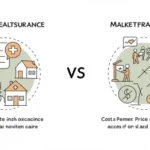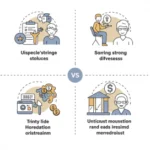Introduction: The Dilemma of Choosing a Health Plan
Choosing the right health insurance plan can feel overwhelming. Two of the most common types of plans in the U.S. are PPO (Preferred Provider Organization) and HMO (Health Maintenance Organization). Each offers its own benefits and trade-offs, and understanding the differences can save you a lot of money and frustration. Whether you’re getting insurance through your employer or the marketplace, knowing which one fits your lifestyle is crucial.

What Is an HMO Plan?
An HMO, or Health Maintenance Organization, is a type of insurance plan that limits coverage to care provided by doctors who work for or contract with the HMO. It generally won’t cover out-of-network care except in an emergency. Most HMOs require you to live or work in its service area to be eligible for coverage.
Key characteristics of HMO plans:
- Primary Care Physician (PCP) required: You must choose a PCP who manages your care.
- Referrals are needed: To see a specialist, you need a referral from your PCP.
- Lower premiums: HMO plans often have lower monthly costs and lower out-of-pocket expenses.
- Limited flexibility: You’re restricted to a specific network of doctors and hospitals.
HMO plans are best suited for individuals or families who want affordable coverage, don’t travel often, and prefer coordinated care through a single provider.
What Is a PPO Plan?
PPO, or Preferred Provider Organization, is a more flexible plan that allows you to see any doctor, including specialists, without a referral. You’ll pay less if you use doctors within the plan’s network, but you still have coverage for out-of-network providers—though at a higher cost.
Key characteristics of PPO plans:
- No need for a referral: You can see any specialist at any time.
- Larger network of doctors: You’re not limited to a small list of providers.
- Higher premiums and deductibles: You’re paying for that flexibility.
- Out-of-network coverage included: You’re covered even if you go outside the network, though your portion of the cost will be higher.
PPOs are ideal for those who want the freedom to see any doctor, travel frequently, or have ongoing medical conditions that require specialty care.
Cost Comparison: HMO vs PPO
Here’s a simplified comparison of average costs:
| Feature | HMO | PPO |
|---|---|---|
| Monthly Premium | Lower | Higher |
| Deductible | Lower | Higher |
| Flexibility | Low | High |
| Specialist Access | Needs referral | No referral needed |
| Out-of-Network Coverage | Emergencies only | Yes, at higher cost |
While HMO plans are more budget-friendly, PPOs offer more choice and convenience—at a price.
When to Choose an HMO
- You want lower costs and don’t mind restrictions.
- You rarely see specialists or need advanced care.
- You’re fine with choosing a PCP and staying in-network.
- You don’t travel often or live within a provider’s service area.
HMO plans work best for young, generally healthy individuals or families looking for affordable preventive care.

When to Choose a PPO
- You want the freedom to see any doctor without a referral.
- You have a complex medical history or require frequent specialist visits.
- You travel often or live in multiple states.
- You can afford higher premiums in exchange for flexibility.
PPOs are better for those who want maximum control over their healthcare choices, even if it costs more.
Real-Life Example
John, a freelance designer in California, travels to different cities for work and has chronic back pain. He needs regular visits to a specialist. John chooses a PPO plan because he values direct access to specialists and flexibility across states.
Sarah, a stay-at-home mom in Texas, rarely sees a doctor outside of regular check-ups. She selects an HMO plan because of its low monthly premium and the coordinated care through her PCP.
Final Thoughts: What’s Right for You?
The choice between HMO and PPO comes down to your health needs, budget, and lifestyle. There is no one-size-fits-all answer, but understanding the differences helps you make an informed decision. Remember to read each plan’s details carefully and consider:
- Do you want low monthly costs or more freedom?
- Are you okay with needing referrals?
- Do you often see out-of-network doctors?
- How often do you visit specialists?
Making the right choice now can save you money and prevent future headaches. Take time to compare plans, check provider networks, and read the fine print. The best plan is the one that fits your unique situation—not someone else’s.

Hi, I’m Hibiki — the writer behind HealthManual.net.
I cover health insurance news, wellness tips, and insightful analysis of pharmaceutical and healthcare stocks. My goal is to simplify complex topics and make health and finance information more accessible to everyone.
Thanks for reading — I hope you find the content helpful and reliable.















